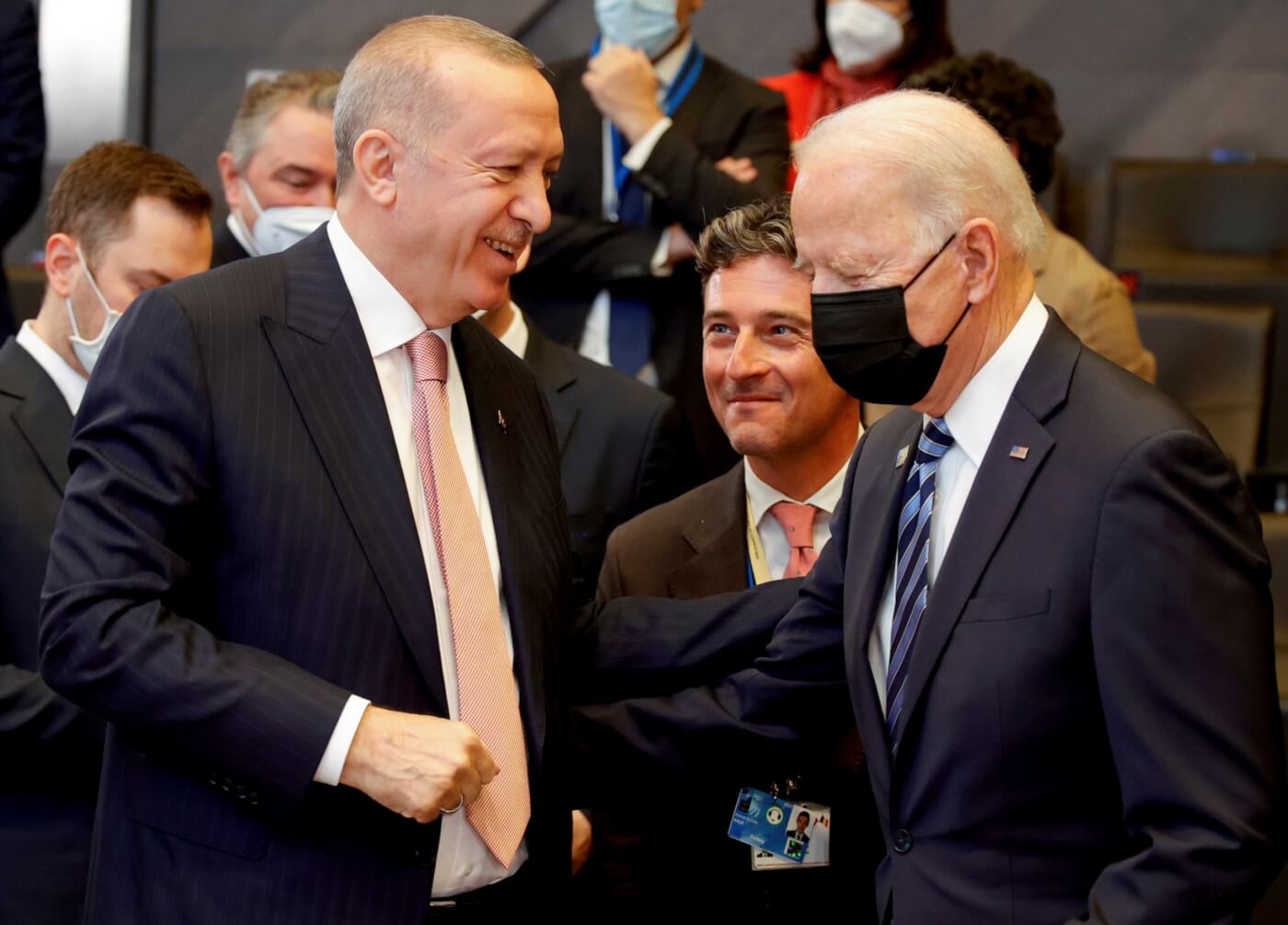Today (Monday 14 June 2021), on the peripherals of the NATO summit in Brussels, American President Joe Biden will meet with his Turkish counterpart President Erdoğan for the first time since being elected.
The two leaders constitute the two biggest NATO militaries and both sides will enter discussions with a healthy list of topics they want addressed.
Erdoğan enjoyed a close personal relationship with Biden’s predecessor, President Trump; What is immediately clear is that the Turkish leader can not expect to carry the same favour under the new American administration.
Biden has significantly cooled the United States tone towards Turkey, calling Erdoğan an autocrat and forcing the Turkish premier to wait three months after Biden’s inauguration for their first contact.
Despite this frosty approach, Erdoğan enters negotiations seeking a fresh start with the U.S leader, with U.S. investment regarded as integral to help rebuild economic growth devastated by the global pandemic and an increasingly weak currency.
Thus President Biden, who has made it clear he views restoring human rights and democracy as pillars of U.S. foreign policy, enters these discussions with distinct leverage. Turkey has significantly regressed on these two pillars under President Erdoğan, who following a failed coup in 2016, has presided over a purge of opposition politicians, quashed civil society and overseen widespread persecution of the country’s minorities.
Given that Erdoğan recognises a positive relationship with the United States is crucial for keeping the Turkish economy afloat, Biden should make it clear that this relationship is completely dependent on a renewed respect for human rights and the rule of law in Turkey.
In particular, Biden should raise the issue of: Treatment of minorities; Arbitrary detention; Women’s rights; Persecution of journalists.
Treatment of minorities
Turkey continues to only accept three non-Muslim groups as minorities – Armenians, Rum Orthodox Christians (Greeks) and Jews – excluding groups such as the Kurds, Roma community, and Assyrians.
Such groups see limits to their political, legal and cultural rights, and ultimately face increased risk to their personal safety. Of particular concern is that these limits may be further embedded in a new constitution, mooted by President Erdoğan in February 2021.
Despite homosexuality being legal in Turkey, opposition towards LGBTQ rights has grown in recent years with Erdogan espousing increasingly anti-LGBTQ rhetoric. The Istanbul Pride march was banned from 2015 – 2019 and was likely to have been banned in 2020 if not for already being prevented with the outbreak of COVID-19.
Arbitrary Detention
Of significant concern is the continued arbitrary detention of Turkish citizens – particularly through the malpractice of counter-terrorism laws. President Erdoğan has presided over a massive witch hunt against his political opponents and critics, made possible by support from his hand picked judiciary, This purge has seen more than 100,000 people detained under overly broad “terrorism” charges.
The case of Osman Kavala has been particularly prominent, with Biden already wasting no time in calling for the philanthropist and civil society leaders immediate release. Kavala has been arbitrarily detained for over three years while on trial in connection with 2013 anti-government protests, a case which many see as emblematic of Turkey’s crackdown on dissent.
Women’s Rights
In March 2021, President Erdoğan dealt a significant blow to women’s rights, announcing Turkey’s withdrawal from the Istanbul Convention, a landmark Council of Europe convention pertaining to the protection of women’s rights.
The decision comes despite shockingly high numbers of femicides in Turkey. Last year alone, Turkey witnessed 300 cases of femicide and 474 the year prior. These numbers are likely to be higher with many cases going unreported. The World Health Organisation recently released figures that showed 38 percent of women in Turkey are subject to domestic violence in their lifetime.
In 2020, a conversation around women rights in Turkey was prompted by the murder of 27 year old Pınar Gültekin, who was killed by an ex-boyfriend. Her death sparked widespread street protests calling for an end to femicides after her remains were found in the woods of southwestern city Mugla.
Persecution of journalists and erosion of press freedom
Perhaps one of the most significant ongoing abuses in Turkey is the continued targeting of journalists. Around 90 journalists and media workers were in pretrial detention or are imprisoned as a result of fabricated ‘terrorism offences’, contributing to Turkey’s ranking of 153rd in Reporters Without Borders (RSF) 2020 World Press Freedom Index.
Until this year, Turkey was the biggest jailer of journalists globally (now second only to China). The government also controls 90% of the national media by means of regulators such as the High Council for Broadcasting (RTÜK),
Journalists are routinely subjected to long jail sentences, illustrated at the close of the year when well-known journalist Can Dündar was sentenced to more than 27 years in prison on charges of spying and abetting a terrorist organisation.
Dündar, a former journalist, is facing charges of revealing state secrets by publishing images of Turkish National Intelligence Organization (MIT) trucks purportedly transporting arms to Syria in January 2014.
Dündar fled in exile to Germany after the government charged him, in absentia, with membership to a terrorist organisation. On 8 June 2021, a Turkish court announced it will seek the extradition of Dündar

